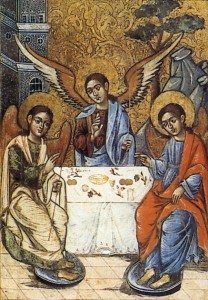Ex 34:4b-6, 8-9
Dn 3:52, 53, 54, 55, 56
2 Cor 13:11-13
Jn 3:16-18
 When teaching Theology 101, I would always incorporate the following True/False question in some form or another into my midterm or final exam: “The Old Testament depicts a God of wrath while the New Testament depicts a God of mercy.” Despite my efforts to teach this statement’s falseness, a surprising number of students would miss it each semester. And I understand why. In 101, we read the Fall which befuddles so many students who simply can’t understand what our original parents did that was so wrong. We read the story of the flood and grapple with God destroying everyone on earth but one family. We talk about the seemingly genocidal campaigns of Joshua and the apparent pettiness of God in rejecting Saul. When we hit the New Testament, it’s Jesus healing the blind and raising the dead and feeding the hungry and showing mercy to the sinner. We don’t talk about the story of Ananias and Sapphira which makes God seem pretty scary indeed, nor do we spend much time talking about the wrath of God continuing to be poured out on sinners as we read in Romans 1:18. But we do spend an awful lot of time talking about the mercy of God in the Old Testament, such that it really in inexcusable that so many students would get the question wrong. Our first reading emphasizes this very point: “The LORD, the LORD, a merciful and gracious God,
When teaching Theology 101, I would always incorporate the following True/False question in some form or another into my midterm or final exam: “The Old Testament depicts a God of wrath while the New Testament depicts a God of mercy.” Despite my efforts to teach this statement’s falseness, a surprising number of students would miss it each semester. And I understand why. In 101, we read the Fall which befuddles so many students who simply can’t understand what our original parents did that was so wrong. We read the story of the flood and grapple with God destroying everyone on earth but one family. We talk about the seemingly genocidal campaigns of Joshua and the apparent pettiness of God in rejecting Saul. When we hit the New Testament, it’s Jesus healing the blind and raising the dead and feeding the hungry and showing mercy to the sinner. We don’t talk about the story of Ananias and Sapphira which makes God seem pretty scary indeed, nor do we spend much time talking about the wrath of God continuing to be poured out on sinners as we read in Romans 1:18. But we do spend an awful lot of time talking about the mercy of God in the Old Testament, such that it really in inexcusable that so many students would get the question wrong. Our first reading emphasizes this very point: “The LORD, the LORD, a merciful and gracious God,
slow to anger and rich in kindness and fidelity.” But the prejudice against the Old Testament God is a hard one to shake. Marcion wanted to throw out the Old Testament precisely for this reason. It is a prejudice rooted deeply in Christian history.
For Christians, the doctrine of the Trinity is what keeps us from getting the wrong answer in asking about the differences between the Old Testament and New Testament God. They are not two different gods. There is only one God: the Father, his only Son, and the Holy Spirit, the Holy Trinity. But it is not just that there is one God who happens to be Trinitarian. It is that the works of this God, the divine economy, is shared among the three persons: “or as the Trinity has only one and the same nature, so too does it have only one and the same operation” (CCC 258). This is to share the divine life, that is, to love. The operation of this Trinitarian God is to call us into relationship with that same Trinitarian God.
In fact, the whole of Christian ethics might be summed up, “Be in union with God.” Jesus says this very thing in the Sermon on the Mount: “Be perfect as your heavenly father is perfect.” The paraenesis at the end of our second reading shows us more specifically how to be in union with God, how we are to love with the perfect Trinitarian love that we are called to share:
Brothers and sisters, rejoice.
Mend your ways, encourage one another,
agree with one another, live in peace
But another foundational point of the Christian moral life is that we simply cannot love with such a perfect Trinitarian love. We cannot be like God. At least, not by our own efforts, however noble they may be. And this is why Christ is the fullness of God’s revelation. It is not that God was doing something different in the Incarnation, but rather that God was giving us the means by which we could finally be like him. This is what our Gospel explains in the oft-quoted passage:
God so loved the world that he gave his only Son,
so that everyone who believes in him might not perish
but might have eternal life.
For God did not send his Son into the world to condemn the world,
but that the world might be saved through him.
In Christ we are saved, in Christ God’s plan for us is made possible. Christ isn’t a different God from the one who flooded the earth or poured out suffering on Job. It is rather that in Christ, we come to know fully the God who did all these things and we come to know the fullness of love from which this Trinitarian God operates, a love which that God calls us to share and in Christ makes it possible to share.
Christian ethics, therefore, is characterized by the normative relationship that undergirds it. Every norm’s telos is ultimately to promote a relationship with the God who is inherently relationship. And just as every relationship is part gift, part response, so too is this one. The relational God offers us in faith the gift of a relationship, a relationship we cannot earn. The rest of ethics is about spelling out the response that love demands.



